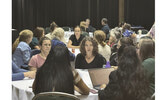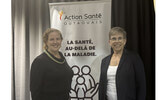“It’s unacceptable:” Pontiac doctor on women’s access to health
Djeneba Dosso
Cries for change and better access to care could be heard from the women gathered at city hall on September 26 during a panel centring on women’s health in the Outaouais.
The panel, led by experts Dr. Ruth Vander Stelt, Marie-Eve Fournier and Patricia LaRue touched on the complexities of navigating a health care system which, despite its developments, still fails women in more ways than one. The hour-long discussion touched on flaws in early medicine, the disparities between care for women and men, reproductive health, and health accessibility issues in the Outaouais and for women living in rural areas.
The main takeaway offered by all three panelists is that health care is far from being analogous. On the contrary, it should be viewed from an intersectional lens to better meet the unique and complex needs of every patient. Despite this, “for years, medical tests were only done on men for men,” pointed out Marie-Eve Fournier, columnist for La Presse, while for women “almost all symptoms were related to stress or menopause.”
The refusal, or perhaps disinterest in going the extra mile to perform tests and diagnoses on women all those years ago has stalled the way they receive care today, she added.
Dr. Ruth Vander Stelt, a Pontiac-based general practitioner, believes the constant downplaying of early symptoms has led to the normalization of pain among women.
“Women are told: ‘it’s all in your head,’ ‘just go and get some rest,’ constantly,” she said, adding the notion that pain should be ignored is often transferred from mothers, generally of older generations — who received the same message from their practitioners — and passed on to their daughters.
Patricia LaRue, the executive director of Outaouais’ Women’s Clinic, named reduced research, limited access to resources and the inability to identify a multitude of symptoms found in women of all ages as repercussions. LaRue runs a feminist medical clinic offering abortion, contraception, sexual health workshops and IUD insertion services to women.
These basic services that should be accessible to female patients often aren’t advertized because the resources are simply unavailable in rural communities, Dr. Vander Stelt said. Due to a lack of access to care in their communities, these women must travel to the city and account for transportation which can cost a fortune by taxi. For women with abusive spouses, trips to the city, even for care, aren’t feasible.
“I’m from the Pontiac and commuting to the city to receive care should not be the solution or the norm,” she said. “Every CLSC should have the right resources.”
Unfortunately, for women in rural areas, their challenges don’t end upon arrival, as obtaining care tailored to their needs is often difficult, primarily due to language barriers.
“Translating barriers are a real issue,” LaRue backed Vander Stelt. “Children are having to translate their mother’s diagnosis because the doctor is unable to communicate in their language, it’s sad and extremely invasive.” This issue extends to newcomers and immigrants or members of a linguistic minority.
In the face of this adversity, many women have turned to social support networks, after their cries were ignored by the health-care system.
“Social media, often seen as a space for misinformation, especially in healthcare, has become a safe space for women,” said Dr. Vander Stelt, listing advocacy and awareness, empowerment, breaking taboos and misconceptions and the receipt of diverse perspectives as benefits of support networks.
LaRue named supporting women’s organizations as another way to boost access to efficient and compassionate care. Fournier suggested doing more research tailored to women’s health. She encouraged doctors to be curious about their female patients, although she understands they’re overworked. Lastly, she preached the benefits of spreading of information by sharing the names of experts both internally and externally to increase their reach.
Still, so much needs to be done, Dr. Vander Stelt said at the end of the Q&A session that followed the panel. “It’s unacceptable,” she said, her voice breaking as tears welled up. She encourages Outaouais women to continue speaking up, as it will allow for change, hopefully. “You guys have the power.”


